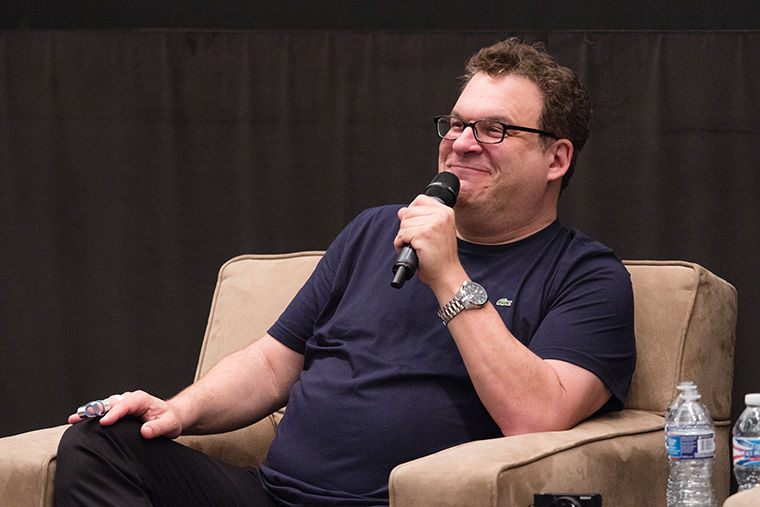Jeff Garlin: ‘You can be as stupid as you want—you’re students!’
Jeff Garlin: ‘You can be as stupid as you want—you’re students!’
November 2, 2015
After being asked by a student which is more important for a comedian to focus on—writing or performing—comic Jeff Garlin said it is a matter of personal preference. However, he noted that while “mediocre” actors can still do well with good writing, only good actors can rise above bad writing, citing a 1994 guest role he had on “Baywatch” as proof.
“I played the villain on ‘Baywatch’—I was the evil disc jockey,” he said. “I’ve always said it’s my best acting because the writing’s pretty bad, and I did scenes with David Hasselhoff and I didn’t laugh. But it’s also my worst acting because of the writing.”
Garlin spoke to Columbia’s aspiring comedians and other creatives Oct. 27, telling them anything he could answer for them, they could likely find out by following their initial instincts.
“If you put a lot of thought into it, it’s really what your gut tells you,” Garlin said. “Your gut is right, unless you’re stupid.”
Garlin, a Chicago native, has solidified his success not only as an actor in hits such as HBO’s “Curb Your Enthusiasm,” for which he was executive producer, ABC’s “The Goldbergs,” and movies such as “WALL-E” and “Daddy Day Care,” but also as a stand-up comic, producer and writer for several other projects including his 2006 independent film “I Want Someone To Eat Cheese With.”
Garlin got his professional start in Chicago in the 1980s and said before he permanently moved to Los Angeles, he was roommates with talk show host Conan O’Brien and sublet his apartment to Jon Stewart.
Garlin, who worked and performed at The Second City in the ‘80s and ‘90s, began the discussion by sharing his experiences working in the famous comedy theater’s box office answering the phones to take down reservations.
Anne Libera, director of Columbia’s Comedy Studies program and host of the event at the 1104 S. Wabash Ave. Building, said she has known Garlin since his time at The Second City, where she was his box office manager—as well as Stephen Colbert’s—in the late ‘80s. Libera said Garlin has always been the type of character he is today.
“He was the worst employee I had in The Second City box office because he was [always] playing on the phone,” Libera said. “Nobody was ever mad because he was so funny.”
Garlin said whenever he dealt with a rude customer asking for a reservation, he would tell them he was going to put their seats in the “puppet section.”
“When it was the ‘puppet section’ [audience members], I told them that during the show, puppets and marionettes dropped from the ceiling and it was the best seat and everybody wanted it,” Garlin said. “So when they would come to the show, the whole show [they would stare at the ceiling], so I got my revenge and some entertainment.”
Libera said she was not sure what Garlin was going to do, but it was clear early on that he would become successful.
She added that because he has worked across multiple mediums, Garlin embodies the Comedy Studies Program’s belief that students should explore multiple areas of work .
“To listen to somebody and say, ‘This is what I did [in my career] and this is why I did [it], you realize these are things I can actually do,” Libera said.
Garlin, who still owns a home in Chicago, added that the city is a good training ground for aspiring comics because it provides opportunities to fail without a lot of people watching, which is always a useful learning experience.
He urged students to focus on improving their skills rather than dwelling on developing a career path.
“Just focus on being great and do the best work you can,” Garlin said. “If you’ve got a career path, you’re an idiot. You’re young so you’re allowed to be idiots. You can be as stupid as you want—you’re students. But if you get to my age and you do stupid things, you’re just a stupid man. You don’t want to be a stupid man.”
Garlin said the improvisational skills taught at The Second City shaped the work he has created, including “Curb Your Enthusiasm.” Especially important, he said, were the skills he learned about being a supportive actor, which have shaped how he acts in scenes both on stage and on screen.
“I am very reactive off of an audience and other actors,” he said. “I wait to see what they give me and react to it accordingly. It begins a dialogue of some sort. To me, it’s always about the other person—the audience, the other performer. If I’m focused on them, it’s a good audience and another actor who is unselfish, it can’t go anywhere but up.”
R. C. Theriault, a senior theatre major and Libera’s student, said she enjoys hearing from accomplished individuals in comedy and being reaffirmed that success in the industry is possible.
“It’s good to have people remind you of that and see someone like that—who never gave up and made it,” Theriault said. “If he can do it, I can, and [I can] remind myself what I’m doing here—to work hard and be serious about what I do.”
The most important qualities for someone pursuing comedy, Garlin said, are a mixture of “vulnerability and confidence.”
Garlin added it is crucial for comedians not to have a large ego—which he said can destroy actors—but have confidence in their training, and still be vulnerable enough to take chances and risk failure.
“I’ve failed more times than I’ve been successful,” Garlin said of his own risk-taking in show business. “Clearly, you are here today, and there was no effect on anyone. Take risks, but look both ways before you cross the street.”








